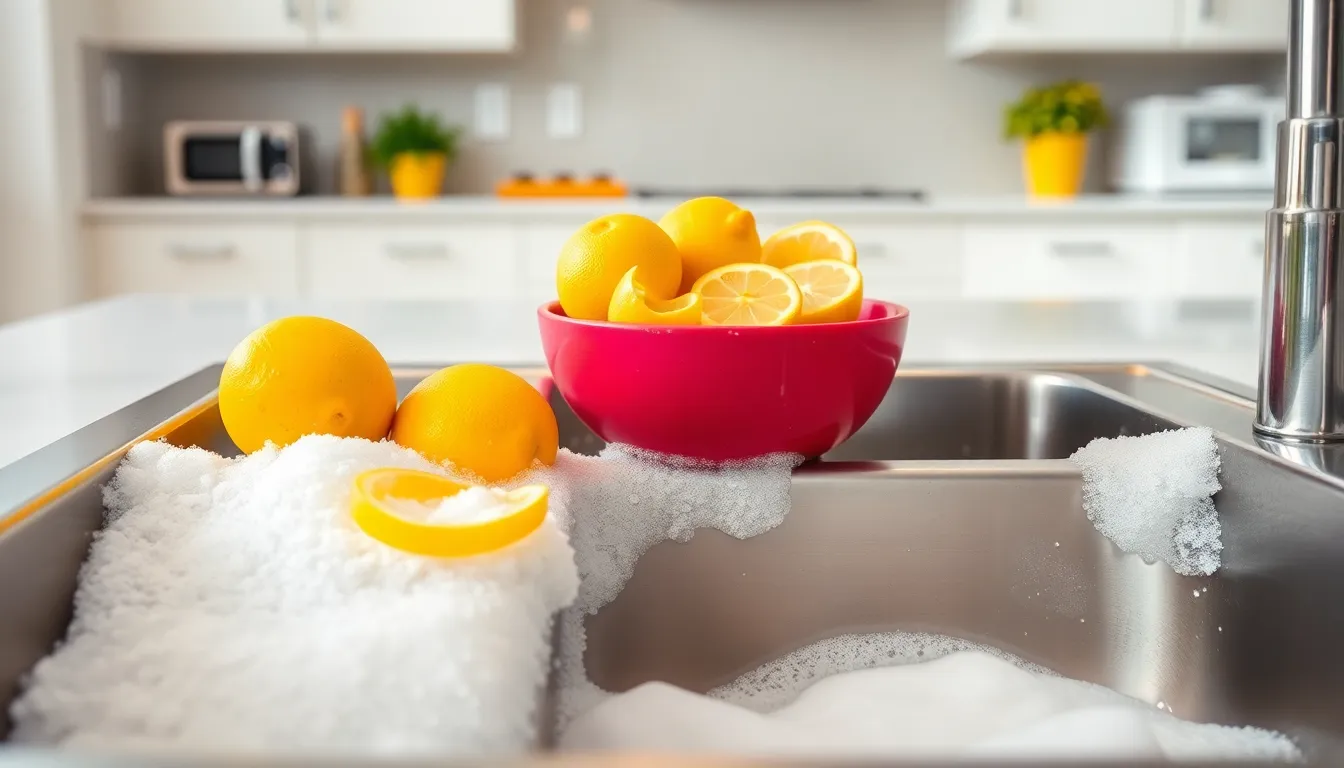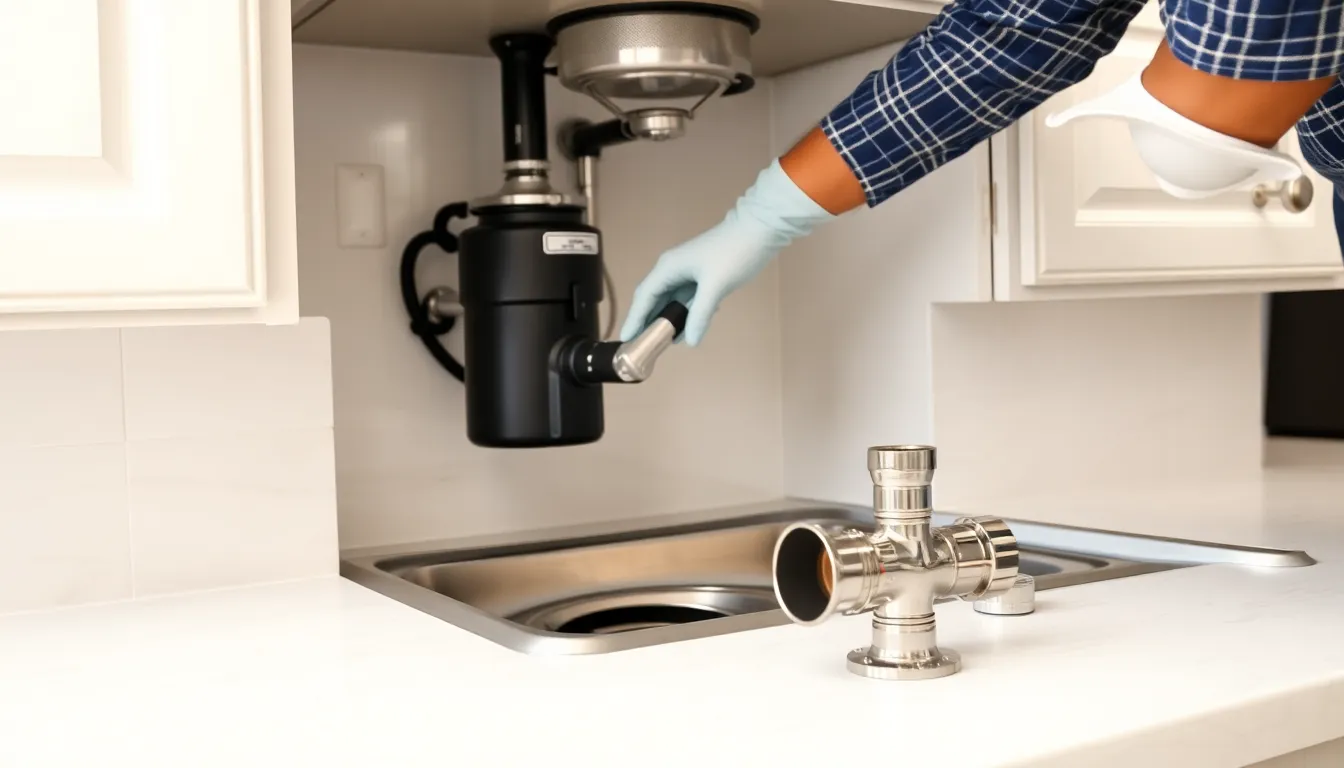
A kitchen sink that smells bad can turn even the most enthusiastic home cook into a reluctant chef. It’s like a horror movie where the villain is lurking right under your nose, and you’ve got to take action before it takes over your kitchen. The good news is that you’re not alone. Many face this olfactory nightmare, and it’s often a simple fix that doesn’t involve calling in a team of plumbers or sacrificing your favorite spatula.
Picture this: you’re prepping a delightful meal, and suddenly, a whiff of something foul wafts up from the sink. It’s enough to make anyone lose their appetite. But fear not! With a little know-how and some clever tricks, that pesky odor can be banished for good. Let’s dive into the reasons behind the stink and how to reclaim your kitchen’s freshness.
Common Causes of Kitchen Sink Smells Bad
Unpleasant smells from kitchen sinks often stem from several common causes. Identifying these issues can lead to quick and effective solutions.
Food Waste Build-Up
Food waste build-up generates odors due to decomposition. Bits of food stuck in the drain trap or garbage disposal create a breeding ground for bacteria. Mold growth also contributes to the foul smells. Regularly cleaning the disposal and running it with ice, citrus peels, or vinegar helps eliminate residues. Ensuring any food particles are thoroughly rinsed away can prevent future build-up.
Clogged Drains
Clogged drains hinder proper water flow and trap debris. Grease, soap, and hair can accumulate over time, leading to stagnant water. Stagnant water fosters unpleasant odors. Using a plunger or a drain snake can reduce clogs, while pouring boiling water periodically clears minor blockages. Homeowners can also try enzyme-based drain cleaners, which break down organic materials and neutralize smells.
Identifying the Source of the Odor

Identifying the source of unpleasant kitchen sink smells includes examining both the garbage disposal and the P-trap. Addressing these areas often resolves the odor problem effectively.
Checking the Garbage Disposal
Start by inspecting the garbage disposal for food waste buildup. Remove any visible debris. Turn on the disposal and let it run with cold water to flush out lingering particles. Pouring a mixture of baking soda and vinegar down the disposal neutralizes odors. Allow this mixture to sit for a few minutes before rinsing with hot water. Regular cleaning prevents food from decomposing inside, which often causes bad smells.
Inspecting the P-Trap
Next, check the P-trap for trapped food, grease, or other debris. This curved pipe under the sink often collects waste, leading to unpleasant odors. Carefully remove the P-trap and clean it with warm, soapy water. Inspect for any blockages that might contribute to the smell. Reassemble the trap securely to avoid leaks. Proper maintenance of the P-trap helps keep the kitchen’s air fresh and the sink functional.
Solutions for Bad Kitchen Sink Smells
Addressing bad kitchen sink smells requires a few simple yet effective solutions. Regular maintenance and natural remedies can significantly improve the freshness of your kitchen.
Regular Cleaning Techniques
Start with a routine cleaning of the sink and disposal. Remove food debris by regularly running hot water while the disposal operates. Using a mixture of baking soda and vinegar can effectively neutralize odors; pour about half a cup of each down the drain and let them sit for a few minutes before rinsing with hot water. Additionally, check the P-trap frequently for any buildup of food or grease. Cleaning it with warm, soapy water every month helps eliminate trapped debris.
Natural Remedies
Utilizing natural remedies often yields impressive results. Lemon peels, for instance, can provide a fragrant solution when run through the disposal. The acidity of the lemons helps combat odors naturally. Another effective option involves using coffee grounds; these can absorb unwanted smells when disposed of in the sink. Regularly sprinkling baking soda in the drain can also trap odors; let it sit overnight for optimal results.
Prevention Tips to Keep Your Sink Fresh
Keeping a kitchen sink fresh requires attention to detail in waste management and consistent upkeep. Small actions can create a noticeable difference in eliminating odors.
Proper Waste Disposal
Dispose of food waste promptly to prevent build-up. Scraping plates into the trash before rinsing can minimize debris in the sink. Using a high-quality garbage disposal also helps reduce odors, provided that it receives regular maintenance. When grinding food, it’s best to run cold water continually to keep everything flowing smoothly. Avoid sending fibrous or starchy materials down the drain, as these can clog the disposal and create lingering smells. One effective method involves periodically grinding citrus peels, which not only freshens but also cleans the disposal.
Routine Maintenance
Setting a schedule for cleaning the sink and disposal keeps odors at bay. Weekly, pour a mixture of baking soda followed by vinegar down the drain, then flush with hot water. This mixture aids in breaking down residues and neutralizing smells. Don’t forget to inspect the P-trap monthly for any build-up, as caught debris can lead to stagnation. Regularly brushing the disposal and the sink surfaces with warm soapy water removes grime. Lastly, running hot water through the disposal after each use promotes a clean system, ensuring a fresher kitchen environment.
Conclusion
Addressing bad kitchen sink smells is essential for maintaining a pleasant cooking environment. By understanding the common causes and implementing regular maintenance practices, anyone can effectively eliminate odors. Simple solutions like using baking soda and vinegar can neutralize unpleasant scents while routine cleaning keeps the sink fresh.
With a proactive approach to waste disposal and periodic inspections of the garbage disposal and P-trap, kitchen odors can be kept at bay. Following these tips not only enhances the kitchen experience but also promotes a healthier home. It’s time to reclaim the kitchen and enjoy cooking without the distraction of unpleasant smells.



